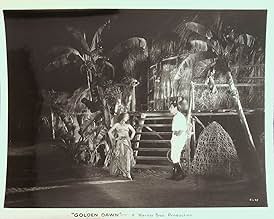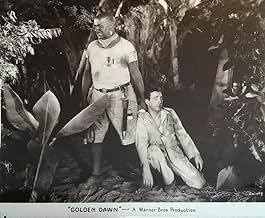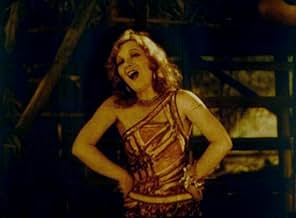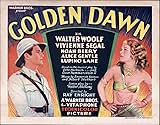Ajouter une intrigue dans votre langue"Golden Dawn" is a musical operetta released by Warner Brothers, photographed entirely in Technicolor, and starring Walter Woolf King and Noah Beery. The film is based on the semi-hit stage ... Tout lire"Golden Dawn" is a musical operetta released by Warner Brothers, photographed entirely in Technicolor, and starring Walter Woolf King and Noah Beery. The film is based on the semi-hit stage musical of the same name by Oscar Hammerstein II and Otto Harbach."Golden Dawn" is a musical operetta released by Warner Brothers, photographed entirely in Technicolor, and starring Walter Woolf King and Noah Beery. The film is based on the semi-hit stage musical of the same name by Oscar Hammerstein II and Otto Harbach.
- Réalisation
- Scénario
- Casting principal
- Tom Allen
- (as Walter Woolf)
- Piper
- (as Sojin)
- Secondary Supporting Role
- (non crédité)
- Hasmali - the Witch Doctor
- (non crédité)
- Napoli
- (non crédité)
- Secondary Supporting Role
- (non crédité)
- Secondary Supporting Role
- (non crédité)
Avis à la une
Inconsistencies and absurdities abound, the most flagrant being the portrayal of a native go- between by Noah Beery in blackface and a ridiculously inappropriate Stepin Fetchit accent; among the most straight-out entertaining sequences are songs added for the film version: "We Two" sung winningly by ace music hall veteran Dick Henderson with Marion Byron. Byron also delights with "A Tiger" – another jazzy number which she milks to the last drop of her pint-sized self. The other, slower songs which came from the stage original ("My Bwana," "Dawn," and "Mooda's Song") fare less well and are harder to understand, despite the fine voices of Segal, leading man Walter Woolf and Alice Gentle as Segal's "mother." Lupino Lane does some astounding acrobatics for "In a Jungle Bungalow." This is not the only bad musical film he enlivened.
The campiest moments occur during the climax when the white girl is about to be married to Mulungu by a bug-eyed, blacked-up witch doctor (Nigel de Brulier) who delivers his lines like a 19th century Shakespearean ham. The rock-bottom melodramatics are so over the top by the time you get to the atrociously dubbed finale, nothing matters any more. You can either goof on it or shrug, be grateful that those days are over, and move on to something more edifying. All in all, a fun fest for parties of musical theatre/musical film aficionados. This movie is to musicals what "Plan Nine from Outer Space" is to science fiction.
This film definitely did not turn out like Warner Brothers expected, I'm sure. It failed at the box office and is today a very unintentionally funny film. The film is set during the first World War in Africa. It is about a native girl, Dawn (Vivienne Segal), who has supposedly been blessed by the gods to appear white, thus marking her as the future bride of the native's god - a statue that appears to be a giant likeness of Mr. Bill from the old 70's skits on Saturday Night Live. A British soldier loves Dawn, but their love is thwarted at every turn both by the fact that the occupying Europeans don't want any trouble with the natives, which they'd have if Tom Allen (Walter Woolf King) eloped with the bride of the native god, and by Shep Keyes, a native bully and strong man who wants Dawn for himself.
Shep (Noah Beery) is supposed to be an African native, yet his name and his accent are purely Gone with the Wind. Plus his black-face makeup is very obviously melting off of his body through his clothing under the hot Technicolor lights, but nobody seems to notice.
There are a large group of civilian Americans and Europeans in the story, and the reason for their presence in this remote African village is never explained. Neither is any reason given as to why they all speak like they're from Queens. One of the things in this film that does work as funny and probably intentionally so is the wiry anemic Ned Sparks-like Lee Moran as Blink and Marion Byron as Joanna, Blink's rough and bossy girlfriend. The one number that works in this film is their rendition of the Song "A Tiger", which Joanna certainly is and Blink definitely is not.
This film, made in 1930, is still using title cards to transition between scenes, something that was still common in the late Vitaphone era. However, even here there are laughs to be found. One title card reads "There was no joy among the natives. A draught was destroying them." As there is no mention of beer or wind in this film, I can only assume the title card writer meant "draught" to be "drought".
For a little over an hour of campy fun in the tradition of "The Dueling Cavalier" in Singin in the Rain, you just can't beat this one.
Believe me, I can see why people would give this a low rating. But if you're into saying "Huh?" and wondering what people were thinking when they were creating something...this is for you.
Le saviez-vous
- AnecdotesThe Technicolor version is apparently lost; only the black and white version survives.
- GaffesComposer Herbert Stothart is billed as "Hubert" in the opening credits.
- Bandes originalesAfrica Smiles No More
(1930) (uncredited)
Music by Harry Akst
Lyrics by Grant Clarke
Sung by Alice Gentle
Meilleurs choix
Détails
- Date de sortie
- Pays d’origine
- Langue
- Aussi connu sous le nom de
- Aurora dorada
- Lieux de tournage
- Société de production
- Voir plus de crédits d'entreprise sur IMDbPro
- Durée1 heure 21 minutes
- Couleur
- Color(2-strip Technicolor, original print)
Contribuer à cette page





















